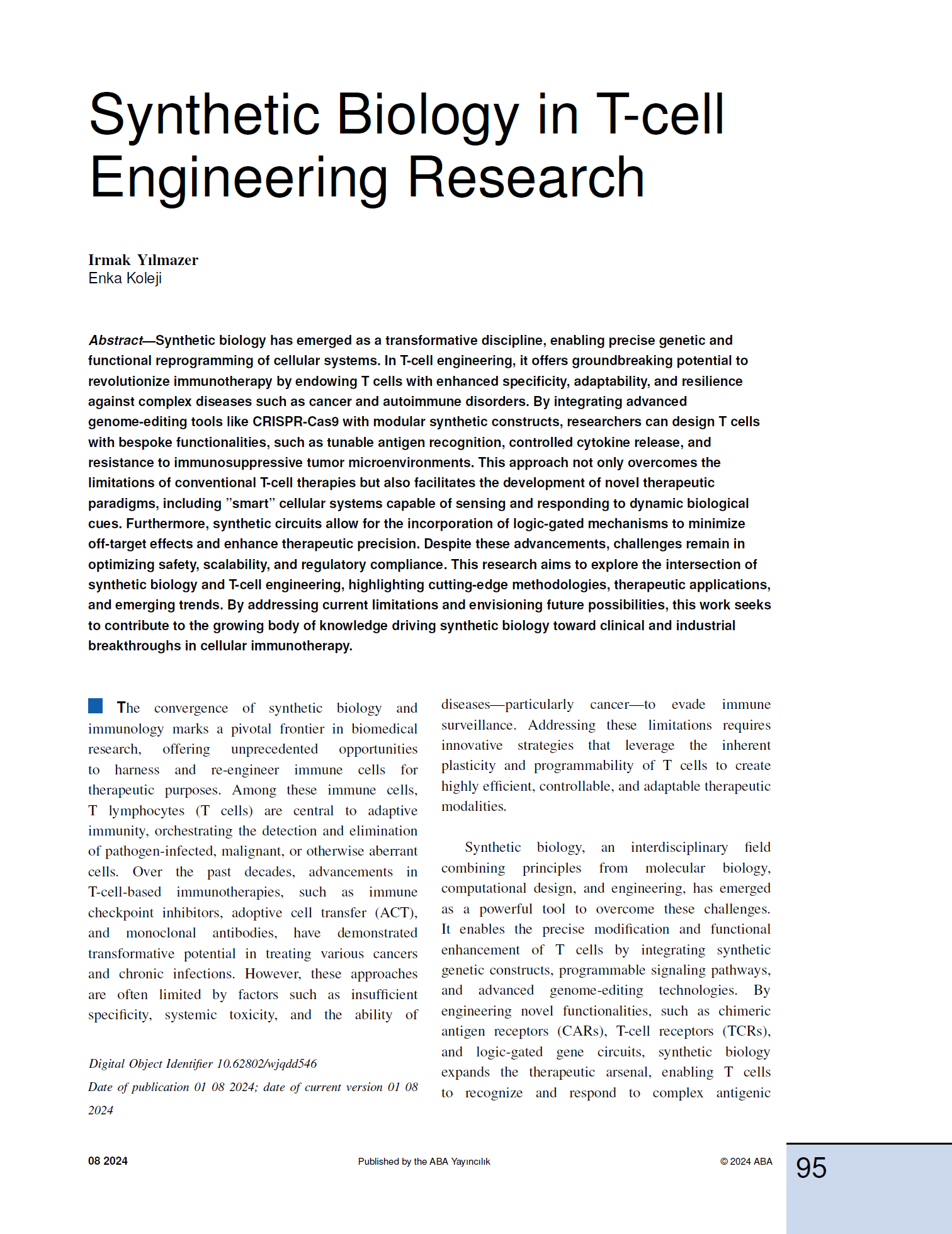Synthetic Biology in T-cell Engineering
DOI:
https://doi.org/10.62802/bqp6es02Keywords:
Synthetic biology, T-cell engineering, immunotherapy, CRISPR-Cas9, chimeric antigen receptors (CARs), antigen recognition, synthetic circuits, tumor microenvironment, cellular reprogramming, precision medicineAbstract
Synthetic biology has emerged as a transformative discipline, enabling precise genetic and functional reprogramming of cellular systems. In T-cell engineering, it offers groundbreaking potential to revolutionize immunotherapy by endowing T cells with enhanced specificity, adaptability, and resilience against complex diseases such as cancer and autoimmune disorders. By integrating advanced genome-editing tools like CRISPR-Cas9 with modular synthetic constructs, researchers can design T cells with bespoke functionalities, such as tunable antigen recognition, controlled cytokine release, and resistance to immunosuppressive tumor microenvironments. This approach not only overcomes the limitations of conventional T-cell therapies but also facilitates the development of novel therapeutic paradigms, including "smart" cellular systems capable of sensing and responding to dynamic biological cues. Furthermore, synthetic circuits allow for the incorporation of logic-gated mechanisms to minimize off-target effects and enhance therapeutic precision. Despite these advancements, challenges remain in optimizing safety, scalability, and regulatory compliance. This research aims to explore the intersection of synthetic biology and T-cell engineering, highlighting cutting-edge methodologies, therapeutic applications, and emerging trends. By addressing current limitations and envisioning future possibilities, this work seeks to contribute to the growing body of knowledge driving synthetic biology toward clinical and industrial breakthroughs in cellular immunotherapy.
References
Ali, A., & DiPersio, J. F. (2024). ReCARving the future: bridging CAR T-cell therapy gaps with synthetic biology, engineering, and economic insights. Frontiers in Immunology, 15, 1432799.
Chagri, S., Burgstaller, A., Schirra, C., Link, J., Zhou, Z., Roth, P., ... & Weil, T. (2024). Synthetic intracellular nanostructures enhance cytotoxic T cell function via assembly-driven chemical engineering.
Dey, S., Devender, M., Rani, S., & Pandey, R. K. (2024). Recent advances in CAR T-cell engineering using synthetic biology: Paving the way for next-generation cancer treatment. Advances in Protein Chemistry and Structural Biology, 140, 91-156.
Hamilton, J. R., Chen, E., Perez, B. S., Sandoval Espinoza, C. R., Kang, M. H., Trinidad, M., ... & Doudna, J. A. (2024). In vivo human T cell engineering with enveloped delivery vehicles. Nature Biotechnology, 1-9.
Kagoya, Y. (2024). Introduction: Synthetic Biology for Cancer Immunology Special Issue. International immunology, 36(2), 45-48.
Kirouac, D. C., Zmurchok, C., & Morris, D. (2024). Making drugs from T cells: The quantitative pharmacology of engineered T cell therapeutics. npj Systems Biology and Applications, 10(1), 31.
Lu, L., Xie, M., Yang, B., Zhao, W. B., & Cao, J. (2024). Enhancing the safety of CAR-T cell therapy: Synthetic genetic switch for spatiotemporal control. Science Advances, 10(8), eadj6251.
Russell, G. C., Hamzaoui, Y., Rho, D., Sutrave, G., Choi, J. S., Missan, D. S., ... & Kim, G. B. (2024). Synthetic biology approaches for enhancing safety and specificity of CAR-T cell therapies for solid cancers. Cytotherapy.
Short, L., Holt, R. A., Cullis, P. R., & Evgin, L. (2024). Direct in vivo CAR T cell engineering. Trends in Pharmacological Sciences.
Zhang, C., Chen, T., Li, Z., Lu, Q., Luo, X., Cai, S., ... & Cui, J. (2024). DSCI: a database of synthetic biology components for innate immunity and cell engineering decision-making processes. Advanced Biotechnology, 2(3), 29.









